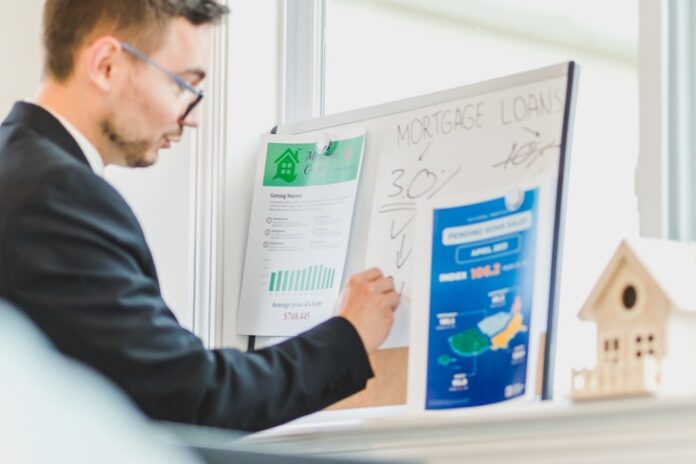A high-interest credit card due or a loan with a hefty interest rate is an ordeal for anyone. However, specific financial measures help you get over such debts in a much smoother way without disrupting your finances. One of the easiest ways to get rid of debt quickly is debt consolidation into a mortgage.
With a debt consolidation or conventional mortgage, you consolidate your debt into easy EMIs. Then you pay it off with a home equity loan, mortgage refinancing, or line of credit.
To learn how to consolidate debts into mortgages and how it works, this guide is for you. Also, read this article for more information on the topic.
How Debt Consolidation Works
Debt consolidation involves combining two or more of your debts or loans into one so that it becomes convenient for you to pay off your existing and new loans. That is, instead of tracking and making various payments, you pay one equated monthly installment each month.
First, compute the LTV or the Loan to Value ratio to understand how it works. It tells you how much equity you have in your home, it helps you to decide if debt consolidation is the right option for you.
For instance, suppose your home’s present worth is $100,000, and your current mortgage is $50,000. To calculate your LTV, divide the current worth of your home by your existing mortgage, which in this particular case comes out to be 50% ($100,000 ÷ $50,000). Another method is using a VA Loan Calculator.
In most cases, lenders allow a maximum LTV ratio of 80%. This implies that you consolidate a debt amount equal to 30% of your home’s current worth into a mortgage in the scenario mentioned above. However, also find lenders that allow higher LTV for debt consolidation.
Opting for Debt Consolidation
Should you opt for debt consolidation? The answer is yes — if you meet the following criteria:
- Your gross monthly earnings are at least twice the debts you pay each month (including the mortgage or rent).
- In most cases, you need an excellent credit score to qualify for a debt consolidation loan with a more affordable interest rate.
- You have a consistent source of income to cover the repayment of your debts.
- You have enough resources to pay off your consolidation loan within a period of five years.
Here is another example: Suppose you have a couple of credit cards with interest rates around 25% each. Assume you make timely payment for your dues. However, you still require a lot of time and have to pay a much higher amount to satiate your credit card dues, even if you regularly make the minimum payments.
However, you possibly qualify for an unsecured debt consolidation loan at a much lower interest rate, given you have a good credit history. The bright side of consolidating your debts into a mortgage is that you know that you pay it off within the given timeframe.
How to Consolidate Debts Using Mortgage
When it comes to consolidating your debt into a mortgage, here is what you do:
Refinance a Mortgage
Many lenders allow you to break down your current mortgage term in advance, and they let you consolidate your existing mortgage and other debts into a single new mortgage. In most cases, lenders allow refinancing of up to 80% of the value of your house.
However, to refinance a mortgage, you must own a house with a mortgage. It is also prudent to mention that breaking out of a mortgage contract earlier than stipulated results in a penalty. In most cases, this penalty equals the interest applicable for three months or an interest rate differential.
Get a Second Mortgage
Another way for you to consolidate your debt into a mortgage is by getting a second mortgage secured against your home along with the original mortgage. A second mortgage is an excellent choice for you, as it allows you to consolidate various high-interest loans, debts, and credit card dues into a single equated monthly installment . In addition, it helps you pay off the debt more conveniently while saving a significant amount of money.
You sign up for a second mortgage in two ways, i.e., through a Home Equity Line of Credit (HELOC) or a private lender. In the first case, the appropriate interest rate is within the percentage point of the prime rate. The interest rate charged by a private lender often ranges between 8% and 14%.
Obtain a Home Equity Line of Credit
A HELOC, or House Equity Line of Credit, allows you to borrow money against the equity in your property. This is usually equivalent to the outstanding balance of your current mortgage, reduced from 80% of the present value of your home.
HELOCs have varying interest rates and provide you with greater flexibility to use a portion of your home equity without partially or entirely paying off your existing mortgage. Moreover, unlike a mortgage refinance, you do not pay a penalty fee for your first mortgage. However, you possibly pay a legal fee to avail of this service.
Get a Mortgage with a Private Lender
While, you easily find private lenders to get second mortgages, you possibly pay higher interest rates. However, there is a bright side to getting a private mortgage, i.e., you get more than 80% equity of your home’s value.
Generally, a private mortgage is similar to a home loan. Still, it is issued by a lending institution that is not represented by a monoline lender, credit union, or a traditional bank. It comes in very handy, especially when you cannot qualify for a loan with your existing lender.
While a private mortgage has higher interest rates, it’s still much lower than a personal line of credit and credit card. As such, saves you a lot of money in the end.
Final Notes on Debt Consolidation
Paying off debts is a headache, especially when the interest rates are higher than usual. Debt consolidation is a beacon of hope at such a time. It allows you to consolidate your various payments into one, and it reduces the interest rate on the amount due. Therefore, if you have multiple credit cards or any other debt that you find difficult to pay off, debt consolidation is a way out!
Find a Home-Based Business to Start-Up >>> Hundreds of Business Listings.
















































